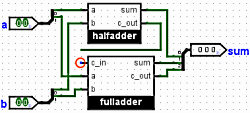Substituting libraries
Now suppose we have two Logisim circuits that are supposed to do the same thing. As an instructor, you might have had students complete an assignment: You have one file containing your solution, but you have several student files containing their work. Maybe the assignment was to build a two-bit adder.
I'll imagine that we have two files, named master.circ and query.circ. Each file contains a circuit named Adder2 (it's important that the circuit to test be named exactly the same), whose appearance is the following.
Adder2 in master.circ Adder2 in query.circ 

As you can see, the master circuit uses Logisim's built-in adder, while the query circuit uses two subcircuits representing a half adder and a full adder (which themselves are built up of simple gates). For the purpose of our example, the query circuit has a stupid error: The carry from the half adder is not connected into the full adder.
We build our testing circuit into a different file test.circ. There, we load master.circ as a Logisim Library | Project |→| Load Library |→ | Logisim Library |, and we insert its 2-bit adder as a subcircuit. We could execute this circuit directly to get the desired output for a perfect solution.
java -jar logisim-evolution.jar test.circ -tty table
But we want to execute the circuit using query.circ rather than master.circ as the loaded library. The naive approach would be to open Logisim and load that library instead; or you might simply remove the master.circ file and rename query.circ to be named master.circ instead. But Logisim includes a handy -sub option that temporarily replace one file by another during that session — without making any changes on disk.
java -jar logisim-evolution.jar test.circ -tty table -s master.circ query.circ
The output you would see from this is shown below; it is of course different from what we saw in the previous section because the library common to adder2 has been replaced in the test circuit by that of query.circ erroneous.
a b sum 00 00 000 00 01 001 00 10 010 00 11 011 01 00 001 01 01 000 01 10 011 01 11 010 10 00 010 10 01 011 10 10 100 10 11 101 11 00 011 11 01 010 11 10 101 11 11 100
Next: Other verification options.